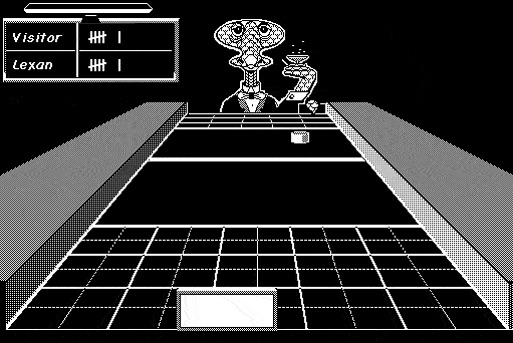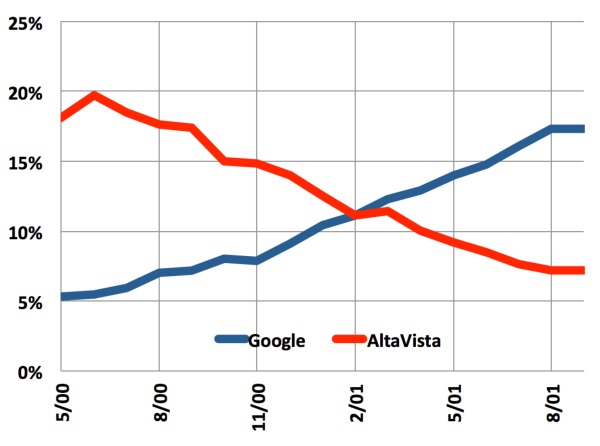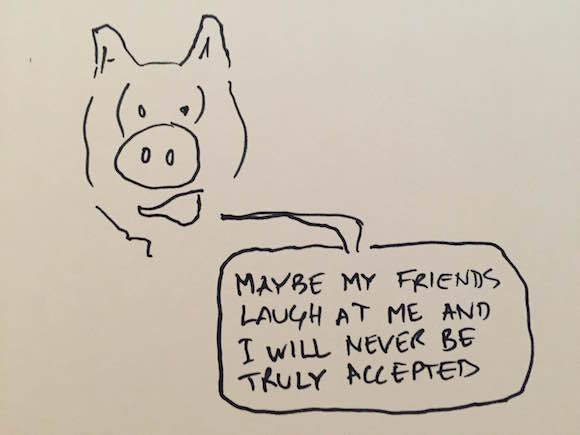This is a story about imitation and flattery...

What's through that door? Well, probably my entire career and every golden opportunity that will ever be presented to me, throughout my adult life.
That North Oxford house, if I've identified it correctly, used to be the headquarters of Daily Information. It was here that on one midweek night, computer games ceased to be a solitary bedroom activity, and instead became an opportunity to socialise.
So important was this place in my childhood, that I can still remember the code for the door behind the front door, that would lead up to my friend's parents' office, which was above the offices of Daily Info.
The main office itself was a fascinating place. There were zillions of flyers and posters pinned up on the wall, as examples of the desktop publishing and reprographics business, which also produces a popular "What's On?" guide for the Oxford area. There were also instructions on how to operate the many pieces of equipment and notices for the staff who worked there. It was a complex ecosystem, so unlike a home stuffed full of static ornaments and pictures.
There were piles of photocopier paper, and cardboard sheets in all colours and sizes. Printer cartridges, ink ribbons, toner, and daisy-wheel heads were piled up on shelves, or stacked nearby the cream-plastic machines that they served. Half-finished print jobs lay on the tops of every available flat surface.
But, the main event, and the thing that a group of geeky and otherwise introverted kids, had gathered there for, were the many computers. There seemed to be screens and keyboards everywhere. There were PCs and there were Macs, and they all had mice and colour screens, which was a big deal back in the 1990's, when people still used to do word processing on green-screen terminals that couldn't play games.
Yes, it was the computer games that we were there for, and between my friend, his mum, and a few willing staff members, they had always managed to coerce all the computers into playing amazing computer games. It was like the most fantastic treasure trove of an amusement arcade, with unlimited tokens to play again and again.
There were single-player games, like Shufflepuck, where you had to play air-hockey against a whole host of fascinating characters of increasing difficulty and deviousness. This was an interesting use of the computer mouse, which mirrored your hand's movements with the on-screen mallet, to try and send an air-hockey puck sliding into your opponent's goal.
However, the thing that I enjoyed the most, was co-operating with other kids to try to solve puzzle games. These were mainly of the point-and-click variety, where you guided an animated character through a world that you could interact with, using a number of verbs, like "push", "pull", "open", "close", "pick up", "walk to" and "use". These delightful creations included such titles as The Secret of Money Island and several Indiana Jones inspired games.
We would would pair up, with one of us operating the mouse, while the other pressed keyboard shortcuts to choose the different operations, while you tried to figure out how to solve the puzzles, which generally involved walking around, opening doors and boxes, picking up items, and then figuring out what to use the items on, or how to combine them together to make some new kind of object.

I idolised this friend who ran the event on a midweek evening, and tried desperately to imitate all the things he seemed to do so effortlessly. I read the same books. I tried to write and contribute articles to a school magazine that he had founded. I tried to learn how to become a programmer, and to create music using a MIDI keyboard, plugged into a computer. I wanted to play all the computer games he liked, which were often the Lucasarts point-and-click adventures, rather than 'shoot-em-ups'.
The bitterness that is so evident at times in my writing, could have ended up repressed and perhaps revealing itself in even more ugly forms, had computing not become a social experience for me, as well as a creative outlet.
Writing has never been my strong suit. When I was about 13 years old, I wrote an article about a computer game that I'd never played, in a desktop publishing program that I was learning to get to grips with. It got horribly mangled as paragraphs got moved around. "Were you on drugs when you wrote that?" my friend asked me, having reviewed it with another friend of his who I never met, on account of him going to a different school. I was put in my place, although not maliciously.
Everything I ever did was a pale imitation of what my childhood friend did, however, it was still immensely fortuitous that I had this role model in my life.
By writing computer programs nearly every day throughout my teens, I gained enough experienced to get a job as a junior programmer, some 3 years ahead of my peers. A few years later, there was a skills shortage because of the Y2K millennium bug, and I was able to get a very lucrative contract. Having held a graduate position for a prestigious corporation, and also been an IT contractor before the age of 21, I was then able to break into financial services and banking, which is normally off-limits to anybody without a good degree from one of the top Universities.
It should be remembered that there are many talented geeks, plugging away at code in their bedrooms. The difference between those who are 'tame' and able to play nice with others, is whether they have had adequate social contact. I was certainly rather removed from healthy social bonds by too much screen time, spent in isolation in a darkened bedroom, hunched over a keyboard.
Through people like the friend I idolise, the joy of computing became a joy of using technology to have a shared experience, to use computers as a mechanism for social bonding. Even though I had to move away from Oxford because my parents relocated the family, I was able to reproduce a little of the magic I learned at Daily Information and the social group that clustered around this one charismatic friend.
I learned how to connect computers together using coaxial cable, and I used to have groups of friends get driven over to the family home, with their PCs. We used our paper rounds and washing-up jobs, in order to buy the equipment necessary to allow our computers to 'speak' to each other, and so we were able to play co-operative games, with each of us operating our own computer.

As a bunch of 14/15 year old spotty nerds, having these early "LAN" (network) parties was amazing, even if we were cooped up indoors for whole weekends, waging virtual warfare against each other. Games like Doom were popular with us, where we just attempted to kill each other, but the pecking order was soon established, and the one-on-one combat soon grew tiresome.
We moved onto games like Command and Conquer where we could have two teams, each in their own "war room" connected by an extra-long cable that I had bought for the specific purpose of separating us, so that we couldn't hear each other's tactical discussions. A game would last over 12 hours, with us playing right through the night.
Because of the inspiration to write and to publish, plus the few social skills I had developed and the exposure to the reprographics and 'typesetting' industry, as a teenager I was confidently able to get a Saturday job for a little company that was like a smaller version of Daily Information, in Lyme Regis, called Lymteligence (yes, it had one 'l' missing, which wasn't very intelligent).
I had used money from my washing-up job at a local hotel to purchase my first modem and get connected to the World Wide Web (Internet) after a rather crappy old modem had completely failed to give a connection to my friend back in Oxford, who I was desperate to stay in contact with. For hours, my friend had patiently allowed his phone line to be tied up, while I tried to coerce some antique piece of hardware that I had bought at a car boot sale, into connecting with my distant friend's computer, but alas, he finally convinced me to give up.
At Lymteligence I learned how to author websites, writing the code by hand. I created a website for The United Kingdom Men's Movement. I remember feeling ethically challenged, as I typed up some of the bitter words of men who had suffered painful divorces. Thinking about it now, I feel that I myself could have been driven into the arms of this movement, had I not had a healthy social outlet for my technological skills.
Although it's shameful to admit, and a little creepy, I would try to keep tabs on my friends I had left behind in Oxford, by being a bit of a lurker on the rapidly developing Internet. However, by doing this, in a way I was able to stay abreast of advancements and trends that would otherwise have passed me by.
"Social media" means Facebook, Twitter and Instagram, today, and perhaps Snapchat and Vine. In fact, there is probably a movement that's already begun that's going to kill these technology giants, that I'm not even aware of yet. I've always been a bit behind the curve.
However, back in the day, social media meant bulletin boards, forums and websites like Friends Reunited. I have no idea how I managed to maintain a toe-hold of social connection with old friends, throughout the disruption of moving away and then our adult lives, but the Internet always provided a way.

It used to be the case that the search engines, of which Google didn't feature prominently until surprisingly recently, used to be very good at digging out which particular corner of the Internet your friends were hiding in, provided they were using their real name, and that name is quite uncommon... and my role model friend is blessed with quite a unique name.
Now that we tend to do most of our Internet social activities on Facebook, you'd be surprised to learn that your privacy is actually very well protected, and you have a reasonable level of control over what people can and can not find out about what's going on in your world.
In 1999/2000 I was living in Winchester in Hampshire, UK. Things were going well with my career, but I was struggling socially. Through a housemate, we ended up in the NUS (student) bar at Winchester University. I was leaning up against the table football table, when somebody behind me challenged me to a game. I turned around and realised that it was one of my fellow Daily Information computer club friends, and a guy who I went to school with since about the age of 5.
Reconnecting with an old schoolfriend was great. I had been back to Oxford, in order to show off my company car and boast about how well my career was going, but it was crushing inadequacy and a sense of loneliness that had driven me to go back there. I had even been quite evil and immature, and had wanted to exclude certain friends and monopolise other friends' time, in order to try to salve my insecurity. I was still a deeply troubled, lonely person, expressing that in very unhealthy ways.
Shortly after that chance meeting, I picked up a local newspaper and read that somebody had been electrocuted, while trying to take a short-cut underneath some parked railroad carriages, in order to get back to his University halls of residence. It was our childhood friend. Killed, through a momentary lapse of judgement, while under the influence of alcohol and the excitement of a fun night out in town. Tragic.
This put me - the lurker - in a really strange position, in terms of grieving. I later discovered through the Internet that my friends were attending the funeral, but because of the sense of distance and the shame of admitting that I had been somewhat jealously following our old social group from afar, like a stalker, I didn't know what to do. I procrastinated until it was too late, and the funeral was over.
There used to be so much stigma associated with using the Internet as a means of human connection. Admitting that you met your partner through Internet dating was likely to instigate stifled sniggers and snide remarks about axe-murderers and weirdos. I guess I am a weirdo though.

I don't know whether it's a British thing, or perhaps a function of a lonely childhood and being a needy, oversensitive person, but I'm kinda always struggling to articulate my needs and ask for what I want. I don't even admit to myself, what my fears and unmet needs are.
Writing this blog has been a journey for me, but it's taken me further than I would have ever expected. One leg of the journey was 5,351 miles, and took me to the hometown of a bunch of my idols and role models.
Is it creepy, is it weird, is it an unpleasant amount of pressure, knowing that in some sense, a friend is looking to you for guidance and direction? It must be, a little. Why the hell do I never seem to have grown up and gotten over childhood infatuations?
For me and at least one other friend, our mutual friend has provided at least some of the inspiration for our careers. In a way, I at least owe this friend a debt of gratitude for my financial security and the fact that a lot of doors are open to me, for career opportunities. I know that he shared with me at least a twinge of regret for having perhaps nudged one of our friends down one particular technology path.
Who knows what are going to be the knock-on effects of the connections we make with one another. Who could have foreseen that I would have taken the wealth that I generated so effortlessly in the highly paid tech sector, and use it to implode so spectacularly in my mid-thirties.
Of course this is not about blame, but instead, I feel this great sense of responsibility. I feel that there are certain individuals who I am crippled with shame, to imagine reading my sorry tale and thinking "what kind of monster has this guy turned into". I imagine their disappointment, and it slays me.
Where do we look for guidance and inspiration from in the world? Our parents? Well what if your parents don't provide it? In fact, what if your parents provide a cautionary tale for how not to live your life? I don't want to go into the details again, of why I don't want to follow in the footsteps of either of my parents, but suffice to say, I've always been looking to people outside of my family, to provide feedback and inspiration in my life.
So, I'm fessing up. That's what this whole blog has been about. I'm playing up like a kid and wanting to test my boundaries. When is some parent-like figure going to stand up and say "stop that!" so that I know I've gone too far? When is some authority figure going to step in, and tell me that I'm out of line, and give me some guidance on how I should think, act, speak?
Being given stacks of cash, relatively few responsibilities and no social structure around you, to tell you when you're taking things too far, when you're getting yourself into trouble, when you're wandering too far from the flock, when your ideas are getting too outlandish, when unpleasantness is rearing its ugly head. You probably take it for granted, the checks and balances that exist around you.
So, I'm making an appeal, to people from every period in my life, from every stage in my development: from childhood to adulthood, from Oxford, to Dorset, to London, to Cambridge, to San Francisco, to Prague, to France, to Brazil, to New Zealand. I'll travel round the world a million times, if somebody can just reach out and give me some kind of reality check.
I'm pouring my heart and soul out into the chasm of the Internet, hoping to make a connection with people, hoping to trigger some kind of response. I have no idea how I'm received. I have no idea how I'm perceived.
Yes, it's needy and yes, it's kinda pressuring people to say something where it seems impolite to even ask for feedback. We have lots of phrases that kinda shame people into keeping their mouths shut, like "emotional blackmail" and "attention seeking". If somebody even came out and accused me of such things, at least I'd have something to reflect on.
Everytime I ask somebody a direct question, they seem to think that the kindest thing to do is to spare my blushes, but I don't know whether to trust my own instincts, or actual concrete feedback that I've received.
For example, I was living with some friends, and it was only over dinner one night, when I had moved out of their house, that my friend finally let me know what he really thought and felt. The fact that the truth was suddenly unleashed was brutal. There was real pent-up frustration and having it all released all at once was too much to bear.
I just contradicted myself, didn't I? What an awful, needy, demanding person. I want honest feedback, but I want it little and often. I'm asking for people to give me a reality check, but I'm also admitting that the last time that a close friend fired both barrels at me, I nearly committed suicide. Who wants that kind of responsibility?
But, you know, the takeaway from this is that I didn't commit suicide, and even though that friendship was really badly damaged, at least it moved things along. I was in limbo before... really unsure of what was real, what I'd overheard, what was being said behind my back. It's an impossible way to live, like that.

I'm adrift in a vast ocean, with no tether to any fixed objects. I have no point of reference. I couldn't tell you which direction is which, and where I'm travelling from or to. I'm rather lost.
A friend got in contact earlier in the week, and offered their impression of something I wrote - noting that I had become bitter again - as well as some advice. I can't stress enough how this was like gold dust to me.
I'm not sure you realise how disconnected from the world I've become. I don't have any normal healthy friendships anymore, or regularly see people who I've had a long-term relationship with, knowing me for years, so they can comment on how I've changed. So many people have become just another 'like' on Facebook.
As a friend who I chatted to via Facebook messenger today said, we know what all our Facebook friends position on Britain leaving the EU is, but we don't know what's going on in the lives of those who are not sharing anything personal, except political opinions. There's a vast difference between the occasional reminder that somebody is still alive, because they're active on social media, and actually looking somebody in the eye, when they give you the British knee-jerk reaction of "I'm fine" when you ask how they are.
I appreciate I've written a lot, and huge amounts of it is virtually unreadable. Also, long bitter rants are not exactly pleasant reading, nor do they paint myself in a particularly favourable light. Who wants to know that angry venomous twisted person, hunched over their keyboard, blindly firing resentful and blame-filled missives into the void.
If you've persevered this far, I'm ashamed of myself. I think about all the stuff you must've read, and what you must think about me, but of course this is conjecture. I admit, I am trying to cajole you into giving me some feedback.
You know, I often think about how immature and childish I am. I often think that everybody is in the same boat, and we're always going to be left wondering how other people perceive us, and what people really think about us, to some extent.
It's easy to dismiss a lot of what I'm wrestling with, as just a standard part of the human condition. I'm also reflexively programmed to offer up neutralising statements, as standard, such as "I don't think I'm special and different" and "I know that my life is no more stressful and turbulent than yours".
The engine that drives this verbal diarrhoea is the fact that I do feel insignificant and worthless. I'm driven to try to anchor myself back into the world of the living, given that I have been hospitalised so many times with suicidal and self-harming behaviour. In a lot of ways, I feel justified in telling people who want to guilt-trip me into suffering in silence to shove their "you're not special, shut up" statements up their arses.
How does one go about fixing the very real and practical things, such as figuring out how to live amongst your friends once again? Sure, I can reconnect with people, but if they don't like who I am and what I say, what hope is there of there being any lasting relationship?
Anyway, this stuff is always cringeworthy and difficult to read, so I'm going to leave it there, as an open letter to my friends and acquaintances. An appeal to human connection, and the feedback that is essential for social bonds.

It's mighty cold when you're out in the thin atmosphere of the outsider, frozen and clinging onto life.
Tags: #friends #childhood #oxford #career #computing #socialmedia #suicide #depression


